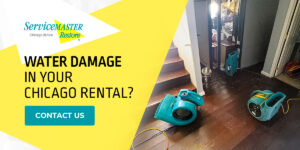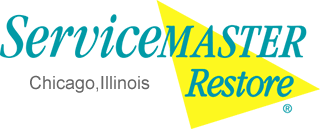Renters' Rights to Water Damage in Chicago, IL
Renting a home or apartment offers benefits like not having to keep up with expensive renovations or making costly repairs, but there can be fuzzy lines between who is responsible for water damage in a rental unit — the renter or the landlord? It depends on factors like your lease agreement, insurance and state laws.
Before entering into an agreement with a potential landlord, it’s important to understand your rights as a tenant and what you can expect in an unexpected situation like a flood or frozen pipe. Some landlords may refuse to make any repairs or take longer than necessary to fix the problem, causing additional damage. If you’re caught in a soggy situation, how can you determine who is responsible for the water damage in your home?
What Causes Water Damage in Apartments?
Whether water damage happens quickly or develops slowly over time, you may need to request professional water restoration services in the event of:
- Plumbing failures: Leaks or burst pipes can allow water to escape from plumbing systems. The continuous water flow may seep into surrounding areas, causing moisture buildup and structural issues.
- Faulty appliances: Components such as hoses and gaskets can wear out over time. The deterioration may cause water to escape from appliances, pool onto the floor or seep into surrounding cabinets and walls.
- Flooding units: Water may leak from tubs, sinks or pipes. When left unattended, the water may travel through building structures, seeping into the ceiling and walls of the unit below.
- Improper rainwater control: Damaged roofs and clogged gutter systems may prevent rainwater from properly channeling away from a building. Improper water flow may damage a property's structure, foundation or landscape.
Who Is Responsible for Water Damage in Apartments?
The Illinois landlord-tenant laws require landlords to keep rental units safe and habitable. For this reason, landlords are often responsible for water damage in apartments and homes. If leaks or flooding occur, the landlord must have damaged fixtures and building structures repaired. In most cases, tenants have responsibility for their own belongings.
A tenant may be considered liable if their negligence causes water damage. For example, tenants may be responsible for resulting damage if they ignore slow leaks or clogged toilets. No matter who's at fault, you should research your water damage rights. You can find more information about local ordinances through the Chicago Renting Right hotline.
Review Your Lease Agreement
As a tenant, it's essential that you fully understand your lease before signing. If you have any misunderstandings about the language in your lease, ask your landlord to clarify points. In some cases, your landlord may have property insurance that will cover any water damage or other issues that arise in your apartment.
Part of signing your lease ensures you live in a habitable place — if you experience water damage, you have the right to cancel your lease if the damage is extensive enough. However, if you didn’t understand your lease at signing, the documentation may state that the landlord can evict you if any partial or total water damage occurs in your rental unit.
Document All Rental Maintenance and Needed Repairs
A landlord is responsible for maintaining properties and performing repairs as needed. This maintenance includes making sure all toilets, sinks and bathtubs are functioning properly. If your plumbing isn't working correctly because of your landlord's negligence, it's their responsibility to fix the problem.
To prove your landlord was negligent, you have to be prepared with documentation of when the plumbing problem occurred, when you reached out to your landlord and if they reacted to the problem promptly.
Keep in mind, not all water damage in a rental unit is the landlord’s fault. As a tenant, you’re also responsible for maintaining the property while you live there. For example, if your landlord informed you of how to properly care for pipes during cold weather and they burst due to your negligence, the landlord is not responsible. If the landlord did everything they could to educate you on proper cold-weather plumbing maintenance, they can avoid paying for any damage.
Get Renters Insurance in Chicago
As a renter, you should always consider purchasing renters insurance for your unit if your landlord doesn’t require it before signing your lease. Shop around to find the right insurance for you and your property — some will cover your personal property, others will pay for the cost to repair damage to floors, ceilings and walls, while others may even cover the cost for you to stay in a nice place for the duration of repairs.
It is important to act fast once you experience water damage in your rental, so being prepared with the above is key. Water damage can quickly lead to mold growth, which can become dangerous to your health. Learn more about renters' right to mold in Chicago.
Review the Property and Personal Property Damage
Depending on whose fault the water damage was, insurance should cover the cost of repairs. Damages should be covered by your landlord's insurance, typically. If the damage is not due to the landlord, but to your error, then your renters insurance should cover the repairs. If your plumbing issue is a surprise and no one’s fault, watch your landlord to make sure they don’t try to avoid covering the repair.
In the case of your personal property, like with property damage, it depends on who is responsible for the damage. If the issue is due to your landlord not properly maintaining the property, then they are responsible. But if you neglect to report a plumbing issue or let your sink overflow, for example, then you are responsible for replacing or fixing your belongings.
How Long Does a Landlord Have to Fix Water Damage?
In Chicago, landlords typically have around 14 days to initiate repairs after a tenant provides the first written notice reporting water damage. If the water damage poses an immediate health or safety threat, you can formally ask a landlord to address the issues within 72 hours.
Immediate Health and Safety Threats
Some primary concerns for prompt action include the following:
- Mold growth: Excessive moisture can provide the environment mold spores need to germinate and multiply. The growth can contaminate the air, causing allergic reactions and respiratory issues.
- Electrical hazards: Moisture around outlets and wiring may cause electricity to flow through unintended paths. Leaks or flooding may lead to short circuits, shocks or sparks.
- Structural concerns: Prolonged exposure to moisture may cause building materials to rot, rust or deteriorate. Apartment water damage may cause ceilings to develop visible water stains, drip or sag.
- Contaminated water: Potential leaks can introduce dirt, debris or sewage into indoor living spaces. Stagnant water around walls, floors and foundations may create mold and cause health issues if inhaled or ingested.
State Laws and Chicago Renter Rights for Water Damage
If you experience difficulty with your landlord, consult your state’s laws to determine how to proceed. If you’re in the Chicago area, renters have extensive rights. If you find your landlord has not maintained the property — including upkeep of the roof, appliances and plumbing, electrical systems and overall habitability of the premises — you have a variety of options depending on your situation.
Your Chicago renter rights include:
- Lease termination
- Deducting the cost of repairs from the month’s rent if the repair is less than $500
- Withholding the cost of repairs from the month’s rent
- Suing your landlord for damages
Water Damage in Your Chicago Rental? Call ServiceMaster of Lincoln Park Today!
At ServiceMaster of Lincoln Park, we pride ourselves on offering fast and friendly service to all residents in the Chicago, Illinois, area. Our expert technicians have over 25 years of restoration experience. We offer a full range of services to cover your water cleanup and repairs and provide emergency 24-hour services. For your plumbing repair or cleanup, give us a call today at 773-346-6767 or complete our online contact form.



Comments are closed.